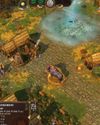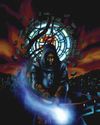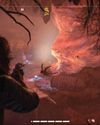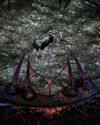
Putting out a Wolfenstein game ought to be the highlight of any developer’s career. It was the making of MachineGames and Gray Matter Interactive, which became the backbone of Treyarch after Return to Castle Wolfenstein – not to mention id Software, whose tribute to a prison-break game launched the FPS genre.
But for Raven Software, it was a disaster. There was nothing wrong with the game, as such: Wolfenstein (2009) is a perfectly serviceable shooter, with an arsenal of impossible weapons built for colourful Nazi evisceration. But it was also a doggedly faithful sequel to Gray Matter’s Return to Castle Wolfenstein, and by that time the b-movie blankness of BJ Blazkowicz seemed terribly old-fashioned. The eight years between the two games had seen Halo, Half-Life 2, and Bioshock – a sea change in the sophistication of first-person adventures. Beyond a surface-level nod to City 17 with a train station opening, Raven had simply failed to learn the lessons of its peers. Wolfenstein shifted a meagre 17,000 copies on PC in its first 12 days on sale, and layoffs followed.
The following year, Raven released Singularity, an ambitiously planned FPS that was about time manipulation. Its dependence on audio logs made it clear the studio had paid attention to Bioshock – but only because in a desperate seven-month sprint to finish a sprawling, nearly-cancelled project, the team needed a way to fill the gaps in its dramatically cut-back story. Delays meant overshooting Activision’s planned marketing push, and financial failure became inevitable. Three teams shrank to two, shrank to one, like the crushed boxes in Singularity’s uninventive puzzles.
RANDOM TASKS
This story is from the June 2021 edition of PC Gamer.
Start your 7-day Magzter GOLD free trial to access thousands of curated premium stories, and 9,000+ magazines and newspapers.
Already a subscriber ? Sign In
This story is from the June 2021 edition of PC Gamer.
Start your 7-day Magzter GOLD free trial to access thousands of curated premium stories, and 9,000+ magazines and newspapers.
Already a subscriber? Sign In

A New Dawn - The rise, fall and rise again of PC Gaming in Japan
The so-called 'Paso Kon' market (ie katakana's transliteration of 'Pasonaru Computa') in Japan was originally spearheaded in the 1980s by NEC's PC-8800 and, later, its PC-9800.

MARVEL: ULTIMATE ALLIANCE
Enter the multiverse of modness.

SLIDES RULE
Redeeming a hated puzzle mechanic with SLIDER

GODS AND MONSTERS
AGE OF MYTHOLOGY: RETOLD modernises a classic RTS with care

PHANTOM BLADE ZERO
Less Sekiro, more Wo Long: Fallen Dynasty

STARR-MAKING ROLE
Final Fantasy XVI's BEN STARR talks becoming a meme and dating summons

THIEF GOLD
Learning to forgive myself for knocking out every single guard.

HANDHELD GAMING PCs
In lieu of more powerful processors, handhelds are getting weirder

FAR FAR AWAY
STAR WARS OUTLAWS succeeds at the little things, but not much else shines

FINDING IMMORTALITY
Twenty-five years on, PLANESCAPE: TORMENT is still one of the most talked-about RPGs of all time. This is the story of how it was created as a ‘stay-busy’ project by a small team at Black Isle Studios